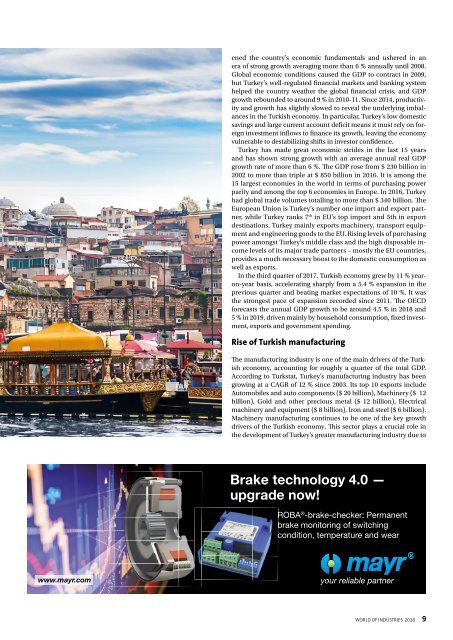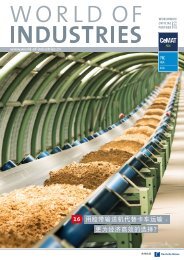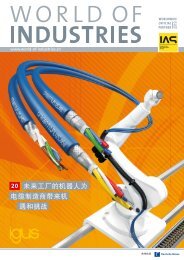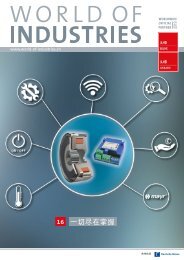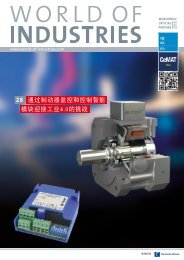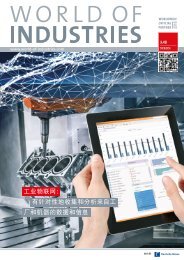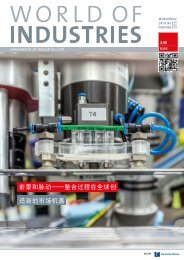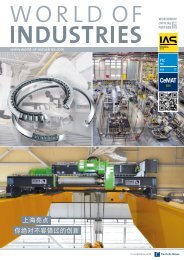WORLD OF INDUSTRIES 01/2018
WORLD OF INDUSTRIES 01/2018
WORLD OF INDUSTRIES 01/2018
You also want an ePaper? Increase the reach of your titles
YUMPU automatically turns print PDFs into web optimized ePapers that Google loves.
ened the country’s economic fundamentals and ushered in an<br />
era of strong growth averaging more than 6 % annually until 2008.<br />
Global economic conditions caused the GDP to contract in 2009,<br />
but Turkey’s well-regulated financial markets and banking system<br />
helped the country weather the global financial crisis, and GDP<br />
growth rebounded to around 9 % in 2<strong>01</strong>0-11. Since 2<strong>01</strong>4, productivity<br />
and growth has slightly slowed to reveal the underlying imbalances<br />
in the Turkish economy. In particular, Turkey’s low domestic<br />
savings and large current account deficit means it must rely on foreign<br />
investment inflows to finance its growth, leaving the economy<br />
vulnerable to destabilizing shifts in investor confidence.<br />
Turkey has made great economic strides in the last 15 years<br />
and has shown strong growth with an average annual real GDP<br />
growth rate of more than 6 %. The GDP rose from $ 230 billion in<br />
2002 to more than triple at $ 850 billion in 2<strong>01</strong>6. It is among the<br />
15 largest economies in the world in terms of purchasing power<br />
parity and among the top 6 economies in Europe. In 2<strong>01</strong>6, Turkey<br />
had global trade volumes totalling to more than $ 340 billion. The<br />
European Union is Turkey’s number one import and export partner,<br />
while Turkey ranks 7 th in EU’s top import and 5th in export<br />
destinations. Turkey mainly exports machinery, transport equipment<br />
and engineering goods to the EU. Rising levels of purchasing<br />
power amongst Turkey’s middle class and the high disposable income<br />
levels of its major trade partners – mostly the EU countries,<br />
provides a much necessary boost to the domestic consumption as<br />
well as exports.<br />
In the third quarter of 2<strong>01</strong>7, Turkish economy grew by 11 % yearon-year<br />
basis, accelerating sharply from a 5.4 % expansion in the<br />
previous quarter and beating market expectations of 10 %. It was<br />
the strongest pace of expansion recorded since 2<strong>01</strong>1. The OECD<br />
forecasts the annual GDP growth to be around 4.5 % in 2<strong>01</strong>8 and<br />
5 % in 2<strong>01</strong>9, driven mainly by household consumption, fixed investment,<br />
exports and government spending.<br />
Rise of Turkish manufacturing<br />
The manufacturing industry is one of the main drivers of the Turkish<br />
economy, accounting for roughly a quarter of the total GDP.<br />
According to Turkstat, Turkey’s manufacturing industry has been<br />
growing at a CAGR of 12 % since 2003. Its top 10 exports include<br />
Automobiles and auto components ($ 20 billion), Machinery ($ 12<br />
billion), Gold and other precious metal ($ 12 billion), Electrical<br />
machinery and equipment ($ 8 billion), Iron and steel ($ 6 billion).<br />
Machinery manufacturing continues to be one of the key growth<br />
drivers of the Turkish economy. This sector plays a crucial role in<br />
the development of Turkey’s greater manufacturing industry due to<br />
Brake technology 4.0 —<br />
upgrade now!<br />
ROBA ® -brake-checker: Permanent<br />
brake monitoring of switching<br />
condition, temperature and wear<br />
www.mayr.com<br />
your reliable partner<br />
Mayr.indd 1 17.<strong>01</strong>.2<strong>01</strong>8 13:47:42<br />
<strong>WORLD</strong> <strong>OF</strong> <strong>INDUSTRIES</strong> 2<strong>01</strong>8 9


